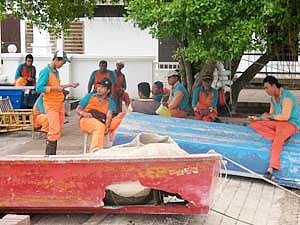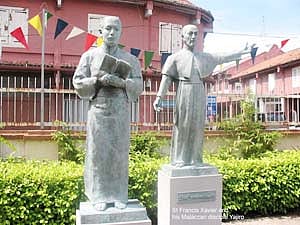
TENSING RODRIGUES finds too many parallels between Goa and Malacca. |
Christmas was the only time we could go on a trip overseas. So we wanted a destination where we would feel the spirit of Christmas. And we chose Malacca; just because of its association with St. Francis Xavier.
Malacca, lying at the confluence of the South-Western and the North-Eastern Monsoons, has wooed the Chinese, the Indians, the Portuguese, the Dutch, the British and the Japanese at different times in its long history. Since times immemorial its port has been frequented by a multitude of ships and merchants from all the Asian nations of the time: Arabia, Persia, China, India, Japan, Indonesia, Ceylon, and Bengal.
In it were gathered and sold all the Asian spices: pepper, cloves, ginger, cinnamon, nutmeg. And that is what attracted the conquerors – the Portuguese, the Dutch and the British. Portuguese ruled Malacca for one hundred and thirty years between 1511 and 1641. Among many remnants of this sojourn are the ruins of St. Paul’s Church, the gate of the fortress “A Famosa” and the community of Kristangs – the offspring of Portuguese men and Malay women.

In the mid-1920s, at the fag end of their rule, the British set off a large area of land along the sea, not far from the Malacca port, as a sort of a reservation for the Kristangs; what has since then been called the Portuguese Settlement or Portuguese Village or KampungPortugis. But, it is not the history of Portuguese rule in Malacca or even that of the Kristangs that interests me at this point; it is their present.
They are organised under the banner of Malacca Portuguese-Eurasian Association; and Michael Singho is the president of that association. This is what Singho wrote around the time of Christmas, 2010: “The coastline at the Portuguese Settlement in Malacca has been transformed by the implementation of its Urban Renewal Development Program since 2003. The Portuguese Settlement literally grew by another 6 acres (2.4 ha), with land reclaimed from the sea. Of this, 3 acres now house the Hotel Lisbon and the rest a car park, a food court and a playground. The main purpose of the URDP was to enhance the settlement as a tourism attraction and further top its potential in this industry.”
“This in turn could bring further benefits to the community in terms of jobs and business opportunities. … There are, however, two glaring situations that need to be looked into seriously. The first revolves around Hotel Lisbon. The building initially planned as a cultural complex, housing bazaar lots and a budget hotel, is designed like a Fortaleza. It has the required features and elements that blend and fit with the Portuguese concept of the surroundings. …”

“The Hotel Lisbon, however, tells another tale. To start with, when the cultural complex metamorphosed into a hotel, opportunities to run the intended bazaar lots/stalls disappeared altogether. What followed was the acute alienation of the community, in the ownership, equity, management or operation of this hotel. Even as employees their participation was minimal and fell along the ranks of kitchen helps, receptionists or security guards even though they possess a natural flair and a wide spectrum of talents in the hospitality business. … To add insult to injury the hotel restricts the sale of beers, wines and alcoholic beverages.”
This is offensive as it imposes upon an inherent social feature where wines, beers and alcoholic beverages find fond indulgence, and are regarded customary within the context of Portuguese culture. Capitalising on the Portuguese theme but altering the portrayal of some of its social characteristics and mannerisms is rather disrespectful and subjugatory even. In fact whatever is relative about the hotel ends with its name and its building. Beyond that, it serves as an indignation that does not complement the overall surroundings except to, perhaps exploit it.”
There are not many Kristangs left now in the Settlement; quite a few of them have migrated to Europe, Canada, Australia and New Zealand. Those who are still there look pretty affluent. But most of them do not talk the creole Portuguese; they have switched over to English. We went to the Settlement on the Christmas day expecting to savour some real Portuguese cuisine – after all we were missing the sorpatel and san’nas of back home.
But nothing of it; all that we could indulge on was Spicy Baked Fish and Calamari in Garlic Sauce. Familiar with the menus in Calangute and Colvathat sounded very familiar; and tasted too. If I found too many parallels between Goa and Malacca, I told myself, let me not blame it on Albuquerque or St. Xavier; it’s much more basic.
Tensing Rodrigues

.jpg)
.jpg)
.jpg)



.jpg)
.jpg)
.jpg)
